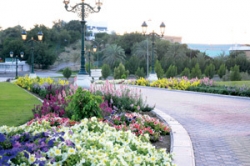 Business & Finance Club Magazine - Real Estate Sector - Adding yet another feather onto the gleaming glory of the Sultanate, this year’s Mercer’s Global Quality of Living survey ranking identifies Muscat as the highest-ranking eco city in the GCC, based on water availability and drinkability, waste removal, quality of sewage systems, air pollution and traffic congestion.
In a survey conducted by Mercer, a leading global provider of consulting, outsourcing and investment services based in the UK among top 50 cities in terms of eco-city ranking with New York as base city, Oman has been positioned number 1 in the GCC region and 48 globally.
Oman's regional position is followed by Abu Dhabi and Dubai (both jointly occupying the 65th position) and in the global arena it held 124.2 index while Calgary in Canada ranked 1 with 145.7 index.
Slagin Parakatil, Senior Researcher at Mercer, commented, "Our ranking this year also identifies the cities with the best eco-ranking based on water availability and drinkability, waste removal, quality of sewage systems, air pollution and traffic congestion. Calgary is at the top of this index (score 145.7), followed by Honolulu in second place (score 145.1) and Ottawa and Helsinki in joint third (score 139.9).
Wellington in New Zealand (5), Minneapolis (6), Adelaide (7) and Copenhagen fill the next four slots, while Kobe, Oslo and Stockholm share ninth place. Port-au-Prince in Haiti ranks at the bottom of this table with a score of only 27.8.
Parakatil commented: “A high-ranking eco-city optimises its use of renewable energy sources and generates the lowest possible quantity of pollution (air, water, noise, etc). A city’s eco-status or attitude toward sustainability can have significant impact on the quality of living of its inhabitants. As a consequence these are also pertinent issues for companies that send employees and their families on long-term assignments abroad, especially considering the vast majority of expatriates are relocated to urban areas.”
Water availability and potability
The earnest attempts of the country in preserving the existing water sources and in exploring newer sources have proved to be fruitful. The Sultanate has been making attempts to maintain its natural water resources particularly after being classified as one of the countries exposed to drought. It has enacted laws and legislations to conserve its water resources. This Ministry of Regional Municipalities and Water Resources is also looking for new water resources so as to be developed, managed, preserved and protected through awareness and necessary restrictions and rational use.
Having blessed with a higher rate of marginal rainfall in the region, which does recharge shallow aquifers on both sides of the northern Oman mountains and the Salalah plain from Jabal Qara, the availability of groundwater in the country has, in large part, staved off the transition to desalinated water supply, as seen in other GCC states.
Besides the ministry concerned, many other ministries are involved in the development of the national plan for water resources to strike a balance between availability and requirement. This is also expected to bring in results in the future.
Effective Waste Management System
The Sultanate has been ranked the least solid waste producing country in the Arab region with as low as 0.7 kilos per day as better waste management practices are in place. This is in addition to the wide campaign to minimise all forms of waste and to support 'reduce; reuse; and recycle' policy.
The ministry of local municipalities and environment executes the environmental legislations and regulations and the monitors through the environmental affairs departments responsible for inspection and monitoring. Furthermore, the ministry has fulfilled the national strategy for the protection of the environment, in which environment and health are the main elements. Some of the legislations and regulations issued by the ministry are concerning the following:
♦ Re-circulating treated waste water
♦ Managing dangerous waste effectively
♦ Managing municipal solid waste
♦ Storage and analysis reservoirs
♦ Emissions to the maritime environment
♦ Radioactive waste
♦ Air emissions, and
♦ Using chemical products
The General Directorate for Environmental affairs as well as the General Directorate for Health Affairs uses their own laboratories for monitoring potential sources of pollution.
Recently, the Ministry of Regional Municipalities for Environment and Water Resources and Oman LNG have forged a partnership aimed at improving waste disposal in Sur and the maintenance of the falaj water system across Oman.
Less traffic congestion
The Sultanate of Oman is noted, among others, for its easy traffic movement as the government has been leaving no stone unturned in initiating various developmental projects and has been steady in its progress.
The Royal Oman Police (ROP) has been relentlessly making efforts in enlightening motorists to reduce road accidents in the country. Recently, the ROP conducted a one-week long road safety symposium that witnessed experts in this area delivering key note addresses and effective training sessions along with a comprehensive exhibition to educate the common public against traffic safety and security.
All these concerted efforts have contributed in ensuring hassle-free movement of vehicles on Omani roads.
In short, a visitor or a resident or a corporate entity in the Sultanate of Oman is assured of a clean environment sans pollution, hygiene and uninterrupted supply of drinking water, better sewage systems that guarantee healthy life and a smooth flow of traffic with various developmental infrastructure projects thus ensuring lesser time spent on road. These concerted efforts, according to experts, are to bring in more accolades and appreciations from various corners to the nation in the future. |